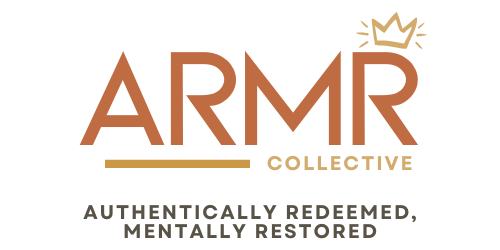As I’ve mentioned in the previous posts in the Armed for Battle series, I’m relatively new to spiritual warfare, repentance, and everything. So after I repented, I thought everything would magically be better. I thought I’d never have any desire to commit the same sin again. But I realized that repentance wasn’t the end of the story. I repented for my sins, my heart changed, but I was still struggling with sin.
Sometimes after we turn to God, we discover lies we didn’t even know we believed. The gap between heart transformation and thought transformation needs a bridge.
So, what do you do when your heart belongs to Jesus, you’ve repented from your sins, but your mind still feels hijacked?
A Quick Note on Deliverance
Before we dive in, I want to be clear about what we’re covering today. This post focuses on the everyday strongholds most of us face: thought patterns, lies we’ve believed, and mental habits that keep us stuck. Think perfectionism, people-pleasing, identity lies, that kind of thing. These are absolutely areas where we have authority in Christ to break free ourselves.
There are definitely more complex spiritual situations that require trained ministry, community support, or professional help, and I’ll touch on how to recognize when you need additional backup. But the vast majority of strongholds we wrestle with daily? We’re equipped to handle those through our relationship with Jesus and the tools He’s given us.
If you’ve been stuck in patterns that feel bigger than everyday thought struggles, don’t worry. We’ll talk about when and how to get the right kind of help.
The Post-Repentance Reality
True repentance, like I wrote in my previous post, is like a heart transplant; it’s a one-time change. After repentance, we often uncover layers of lies and patterns we didn’t see before. The frustration comes when you feel renewed after repenting but still struggle with things like negative thought spirals, fear-based decision making, identity lies, or patterns that feel automatic.
Sins are one thing—sins are what we DO—but strongholds are what GRIPS us.
Defining Strongholds & Deliverance
Strongholds are mental or emotional patterns built on lies we’ve believed. These can form through trauma, repetition, cultural lies, family patterns, mental struggles, etc.
To put it simply, a stronghold is any thought pattern that feels stronger than God’s truth about you. Maybe it’s “I have to be perfect to be loved” or “I’m too broken to be used by God”. It could also be “My voice doesn’t matter” or “I don’t deserve good things”. Whatever the case, we should remember “The weapons we fight with are not the weapons of the world. On the contrary, they have divine power to demolish strongholds. We demolish arguments and every pretension that sets itself up against the knowledge of God, and we take captive every thought to make it obedient to Christ” (2 Corinthians 10:4-5). We have authority and power through Christ to break these patterns and be delivered from the strongholds gripping our lives.
Deliverance is breaking agreement with the lies we’ve told ourselves and instead choosing God’s truth. It’s a constant battle of recognizing lies, finding God’s truth, breaking agreement with the lies, and standing guard against more lies that threaten to come your way. Many strongholds—especially thought patterns and everyday lies—can be broken through personal prayer and applying biblical truth. But some deeper strongholds may need additional support through community prayer, trained ministry, or professional counseling. The key is recognizing which battles you can fight alone and which ones require backup.
Recognizing Your Strongholds
How do we recognize what strongholds we have?
Thought Pattern Assessment
What thoughts feel automatic and hard to shake? What pops into your head without warning and causes you to get stuck in your own mind? What lies feel more real than what God says about you? God says, “You are fearfully and wonderfully made”, but you might say, “You’re wrong.” What areas of your life make you react disproportionately to the situation? Where do you feel stuck despite genuine effort? The answers to these questions could be strongholds.
The Stronghold Test
Another way to identify any strongholds in your life is the Stronghold Test. Ask yourself, “Does this bring life or death? Does this align with how God sees me? Would I let someone speak to my best friend this way? Is this thought leading me toward freedom or not?”
Let me show you how this works. Take the thought “I’m not qualified to help anyone.” This thought rattled around in my head as I struggled with my calling to start ARMR Collective. Does this thought bring life (peace, hope, motivation) or death (discouragement, paralysis, shame)? It brings death. Does this align with how God sees me? No, He’s equipped me and called me. Would I let someone speak to my best friend this way? Never. Is this leading toward freedom or not? Definitely not. This thought failed every test, so it’s a stronghold.
Common Strongholds
Some strongholds can be less dramatic than you’d think, but they’re just as limiting. Perfectionism whispers, “I can’t move forward until everything is perfect”, keeping you stuck in preparation mode forever. Imposter syndrome tells you, “I’m not qualified/good enough/Christian enough” even when there’s evidence contradicting it. Shame spirals insist “I’m fundamentally flawed and can’t change”, making every mistake feel like proof of your unworthiness.
For me, extreme people-pleasing was a major stronghold. I lost sense of who I was, instead changing my whole personality to fit what I thought people wanted. A stronghold I’m working on now is self-limiting beliefs. My mind tries to tell me “Well, you can’t do that because x, y, and z”, but I know “I can do all things through Christ who strengthens me” (Philippians 4:13).
Recognizing the strongholds in your life is step one of deliverance. If you’ve already identified some of your own strongholds, you’re already engaging in deliverance, maybe without knowing it.
Understanding Your Stronghold: Can I Handle This Myself?
Before we dive into the practical steps, let’s talk about recognizing which strongholds you can safely tackle yourself versus which ones need additional support.
Most of the strongholds we deal with daily are perfect for self-deliverance. Things like lies about your identity (“I’m not good enough”), mental habits like perfectionism or people-pleasing, fear-based thinking patterns, and shame spirals—these respond beautifully to the biblical approach of breaking agreement with lies and renewing your mind with truth.
But here’s where wisdom comes in: some strongholds require additional support. If your stronghold involves any history with the occult, generational patterns that feel unusually powerful, or severe trauma that triggers panic attacks, you’ll want to bring in community support or trained ministry. The same goes for addiction patterns that haven’t responded to other treatments.
There are also some red flags that tell you to pump the brakes on going solo. If you feel genuinely afraid when trying to address a stronghold, or if it gets dramatically worse when you pray about it, that’s your cue to get backup. Same if you experience unusual physical sensations during prayer or if the lies feel like they’re coming from an external source rather than your own thoughts.
The goal isn’t to scare you—it’s to equip you with wisdom. Most strongholds you’re dealing with? You absolutely have the authority in Christ to break them yourself. But be wise about when you need to seek outside help.
Practical Deliverance Steps
Step 1: Name the Lie Specifically
Once we’ve identified the strongholds in our lives, we need to get specific about what we’ve been believing about ourselves. One way of doing this is to write the lie down exactly as your mind says it. Maybe you struggle with confidence. Instead of writing “I struggle with feeling confident”, write the thought down exactly: “I believe I have nothing valuable to offer”. Sometimes just writing it down can help ground you and loosen the grip the lie has on you even a little.
Step 2: Find God’s Specific Truth
This is where Google can be your friend (no shame in looking up verses!). Find some verses that speak about the lie and directly contradict it. Next to the lie you wrote, write God’s truth in “I am” statements. To combat the confidence stronghold for example, you can reference Hebrews 10:35: “Therefore do not throw away your confidence, which has a great reward” and write “I am confident. I am faithful. I am promised.”
Step 3: Break Agreement Out Loud
Claim your authority over the lie in Jesus’ name. Pray aloud and say, “God, I break agreement with the lie that [specific lie]. I choose to believe Your truth that [specific truth]. I close the door to this stronghold in Jesus’ name.” Life and death lie in the tongue (Proverbs 18:21). Words have power to them, especially speaking in Christ’s name.
Step 4: Renew Your Mind Daily
Tape the paper you wrote your truths on somewhere you’ll see everyday. Read your truth statements every morning while you get ready. When the lie tries to resurface, because it will, immediately speak the truth. Fill your mind with God’s words about who you are. The enemy may double down knowing that you’ve made progress breaking the strongholds in your life. But persevere and choose to believe what God says about you.
Step 5: Take Truth-Based Action
It can be hard to believe what God says about you, especially if you’re struggling with a mental illness that batters down your self worth and self esteem. But this is where we act like we believe God’s truth, even if we don’t feel it yet.
So what does this look like practically?
Taking truth-based action means making decisions based on what God says, not what the lies tell you. If God says you’re valuable, start treating yourself with value—set boundaries, take care of your health, pursue opportunities. If He says you’re equipped, take that next step even when you feel unready. If He says you matter, speak up instead of staying silent.
These small, obedient actions might feel awkward at first, but they’re actually rewiring your brain. Every time you choose to act on truth instead of lies, you’re creating new neural pathways that make it easier to believe God’s truth over time. Your heart will eventually catch up with your actions.
Daily Freedom Habits
Adding a simple nighttime review helps: “What lies tried to hook me today?” It’s not about perfection, just awareness. And honestly, getting in your Bible regularly makes a huge difference, even if it’s just five minutes.
Worship also helps by being an act of warfare against discouragement. Singing God praises can lift your spirit and help renew your mind. Even just listening to worship music in the car counts. I started listening to mostly worship music a few months back and feel renewed after every work commute, especially when I’m not in the mood to listen to it that day but make myself anyway.
Weekly Freedom Check-Ins
Have little check-ins with yourself to make sure you’re not backpedaling. Ask yourself, “Are there any old patterns trying to resurface?” or “What specific truth do I need to reinforce this week?” Sometimes I can see lies coming before they fully hit, like when I’m stressed or overstimulated, I’m more vulnerable to people-pleasing patterns. You can also try to identify any lies that you may be more vulnerable to. And you can enlist your own little prayer team to help pray for or with you about your persistent struggles.
When Strongholds Fight Back
Like I referenced earlier, when you start fighting back against the strongholds in your life, resistance will always come. Instead of being caught off-guard, we can expect resistance and prepare for it.
Lies don’t go quietly; they’ll get even louder before they get weaker.
When you start breaking free, old patterns often intensify. But this shouldn’t be discouraging; this actually shows that you’re making progress. Keep returning to what God says, regardless of what you feel. If you’re comfortable, confide in a few people to help pray and encourage you. They can help hold you accountable and keep you grounded when hardships come.
Different Types of Deliverance Needs
Based on what you discovered above, here are your options:
Self-Deliverance
Most strongholds can be broken on your own (with God, obviously). They can be broken through personal prayer and truth declarations. Renewing your mind with Scripture and breaking agreements with the lies you recognize can be done on your own without enlisting any additional help from others as long as you maintain daily maintenance of mental and spiritual health.
Community-Supported Deliverance
When You Need Prayer Backup
But some strongholds might be too big to tackle alone. Having others pray with you and speak truth over you can help the lies release their grip on you. Community can also help hold you accountable for new, healthy patterns.
When You Need Formal Deliverance Ministry
For more complex situations, like generational strongholds, trauma-based patterns, or anything involving occult history, you might need formal deliverance ministry with trained leaders. This isn’t about the dramatic Hollywood stuff, but rather experienced believers who understand deeper spiritual warfare and can help you work through the more complex stuff safely.
If you’re dealing with manifestations (unusual physical sensations, hearing voices, etc.), patterns that get dramatically worse when you pray about them, or strongholds tied to severe trauma, please don’t try to go it alone. There’s no shame in getting the right level of help. Wisdom recognizes when backup is needed.
When You Need Professional Mental Health Support
Sometimes, no matter what you do, patterns refuse to shift after consistent self-deliverance or even community support. This is where professional mental health help becomes crucial. If the lies feel overwhelming or affect your daily functioning, therapy can provide tools that spiritual approaches alone might not address. Learn to recognize red flags like when thoughts feel obsessive or uncontrollable, or when you find yourself increasingly isolated from healthy communities.
Suicidal thoughts or other serious mental health concerns may not go away with only deliverance—I know some toxic, pray-it-away “Christians” may try and tell you they will—but this isn’t always the case. Sometimes you need additional medical and professional help, and there is absolutely NO SHAME in that.
I want to be really clear here: if you’re battling depression or other mental health struggles, breaking strongholds might feel impossible some days. I’ve been there. When I was deep in depression, believing “I am valuable” felt like lying to myself. But sometimes you have to act like you believe God’s truth even when you don’t feel it yet. This isn’t about toxic positivity or pretending mental illness doesn’t exist; antidepressants and therapy literally saved my life. It’s about gently, consistently choosing truth over lies, even in tiny ways, even if you have to pretend for a little bit.
You are a beloved child of God, and we need you here. You were created on purpose for a purpose.
Delivered Through Christ
You’re not stuck in patterns that aren’t serving you forever. These strongholds CAN be broken. Your thoughts don’t have to control your life. Remember God’s truth and know that freedom is a process, not a one-time event. Once you know how to break free from strongholds, you’re free to be everything God’s called you to be.
“Whether you turn to the right or the left, your ears will hear a voice behind you saying, ‘This is the way; walk in it.’” (Isaiah 30:21)
God is always with us, for us, and walking alongside us. Now, go speak Truth over your life and break all strongholds in Jesus’ name!
What lies have been feeling stronger than God’s truth in your life lately? Sometimes just naming them takes away some of their power. Know that you’re not alone in this battle. We’re all learning to renew our minds and break free from lies that have kept us stuck.



